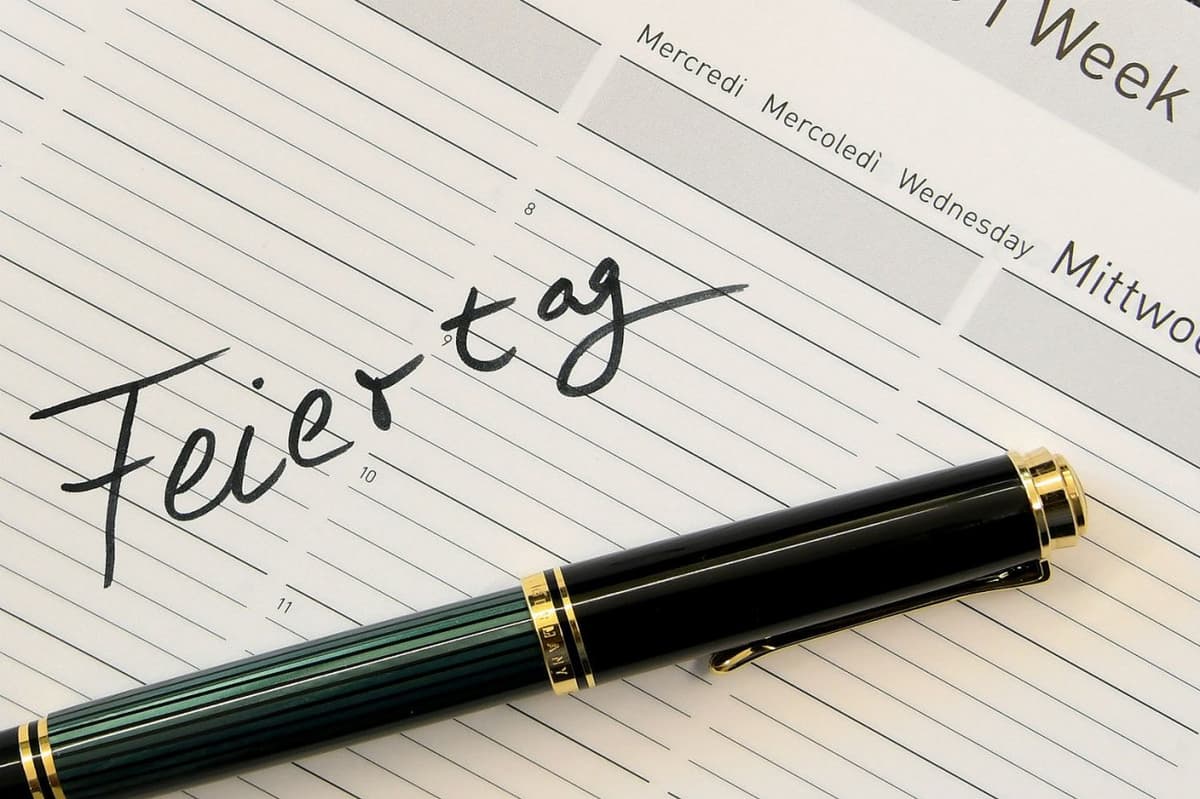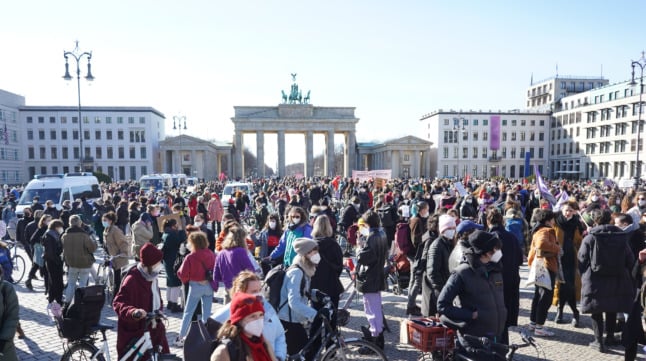What public holidays do workers in Germany get off in 2024?

Germany has a slew of official 'Feiertage' (public holidays) at both the state and national level. Here's what to know to plan your long weekends and getaways in the coming year.
Germany has 20 public holidays in 2024, but only half of them are celebrated throughout the entire country, whereas others are limited to certain states. Most states will celebrate 10 - 13 public holidays. Residents of Bavaria get to enjoy the most work-free days, but other regions have their own unique holidays - such as the recognition of Women's Day in Berlin or Children's Day in Thuringia.
Here are the public holidays for 2024, including where and why German celebrations are observed.
National Holidays
January
Monday the 1st - New Year's Day
March
Friday the 29th - Good Friday
April
Monday the 1st - Easter Monday
Easter, a Christian Holiday celebrating the resurrection of Jesus, is among the most widely celebrated holidays in Germany. Many Easter traditions, such as decorating eggs, can be traced back to pagan spring fertility festivals like the Frühlingsfest.
READ ALSO: 10 ways to celebrate Easter in Germany like a local

Easter eggs (Photo by Bianca Ackermann on Unsplash)
May
Wednesday the 1st - Labour Day
Thursday the 9th - Ascension Day (Christi Himmelfahrt)
Ascension Day in Germany has been celebrated for centuries, and has been a public holiday since 1936. According to the Catholic tradition, it is celebrated 40 days after Easter, and commemorates Jesus's ascension to heaven. The date is also shared with Father's day (Vatertag or Männertag).
Starting from the 18th century, fathers were brought to the center of town in carts, and the father with the most children would be given a large ham. Today groups of men celebrate Vatertag with lots of beer drinking, typically taking a hike with a case of beers in a cart in tow.
Monday the 20th - Whit Monday (Pentecost)
October
Thursday the 3rd - Day of German Unity
The Day of German Unity celebrates the signing of the Treaty of Unification, which formally brought East and West Germany together. When the Berlin Wall fell in 1989, people protested the harsh separation of Germany in two parts. For decades citizens on either side of the divide had not been able to travel freely. On October 3, 1990, that officially changed and the country of Germany we know today was formed.
READ ALSO: 'Unity Day': How October 3rd became Germany's national holiday
December
Wednesday the 25th - Christmas Day
Thursday the 26th - 2nd Day of Christmas
In Germany, one day of Christmas just isn't enough. In fact, the Christmas Advent spans an entire month, starting four Sundays earlier. In the Christian tradition, advent is a time of preparation for the birth of Jesus, which is celebrated on Christmas Day. A second day of Christmas is always observed as a public holiday on the following Monday, allowing families to share one more day of rest and relaxation after the holiday.
READ ALSO: 9 magical ways to give your children the best German Christmas ever
State public holidays
January
Saturday the 6th - Epiphany (Baden-Württemberg, Bavaria and Saxony-Anhalt)
March
Friday the 8th - International Women's Day (Berlin and Mecklenburg-Western Pomerania)
International Women's Day, celebrated globally on March 8, was created to bring attention to the issues of gender equality, reproductive rights, and violence against women. Women's day is a public holiday in many countries, especially countries of Soviet origin.

Women take part in a demo calling for equal rights on International Women's Day 2021 at Berlin's Brandenburg Gate. Photo: picture alliance/dpa | Jörg Carstensen
May
Thursday the 30th - Corpus Christi (Baden-Württemberg, Bavaria, Hesse, North Rhine-Westphalia, Rhineland-Palatinate and Saarland)
August
Monday the 8th - Augsburg Peace Festival (Bavaria)
The High Peace Festival (Hohes Friedensfest), celebrates religious freedom and peace between Protestants and Catholics, and has taken place on August 8 each year since 1950. It’s recognised as a nationwide holiday, but it’s only an official work-free day within Augsburg itself - making Augsburg the German city that celebrates the most public holidays.
Thursday the 15th - Assumption Day (Bavaria and Saarland)
September
Friday the 20th - Children's Day (Thuringia)
Children's Day, first proclaimed at the 1925 World Conference on Child Welfare in Geneva, brings attention to the importance of children's rights and well-being. It is only recognized as an official public holiday in Thuringia, but it may be celebrated throughout the country with gifts from parents to their children and special activities in school.
October
Thursday the 31st - Reformation Day (Brandenburg, Bremen, Hamburg, Mecklenburg-Western Pomerania, Lower Saxony, Saxony, Saxony-Anhalt, Schleswig-Holstein and Thuringia)
November
Friday the 1st - All Saints' Day (Baden-Württemberg, Bavaria, North Rhine-Westphalia, Rhineland-Palatinate and Saarland)
Wednesday the 20th - Repentance Day (Saxony)
Comments
See Also
Germany has 20 public holidays in 2024, but only half of them are celebrated throughout the entire country, whereas others are limited to certain states. Most states will celebrate 10 - 13 public holidays. Residents of Bavaria get to enjoy the most work-free days, but other regions have their own unique holidays - such as the recognition of Women's Day in Berlin or Children's Day in Thuringia.
Here are the public holidays for 2024, including where and why German celebrations are observed.
National Holidays
January
Monday the 1st - New Year's Day
March
Friday the 29th - Good Friday
April
Monday the 1st - Easter Monday
Easter, a Christian Holiday celebrating the resurrection of Jesus, is among the most widely celebrated holidays in Germany. Many Easter traditions, such as decorating eggs, can be traced back to pagan spring fertility festivals like the Frühlingsfest.
READ ALSO: 10 ways to celebrate Easter in Germany like a local

May
Wednesday the 1st - Labour Day
Thursday the 9th - Ascension Day (Christi Himmelfahrt)
Ascension Day in Germany has been celebrated for centuries, and has been a public holiday since 1936. According to the Catholic tradition, it is celebrated 40 days after Easter, and commemorates Jesus's ascension to heaven. The date is also shared with Father's day (Vatertag or Männertag).
Starting from the 18th century, fathers were brought to the center of town in carts, and the father with the most children would be given a large ham. Today groups of men celebrate Vatertag with lots of beer drinking, typically taking a hike with a case of beers in a cart in tow.
Monday the 20th - Whit Monday (Pentecost)
October
Thursday the 3rd - Day of German Unity
The Day of German Unity celebrates the signing of the Treaty of Unification, which formally brought East and West Germany together. When the Berlin Wall fell in 1989, people protested the harsh separation of Germany in two parts. For decades citizens on either side of the divide had not been able to travel freely. On October 3, 1990, that officially changed and the country of Germany we know today was formed.
READ ALSO: 'Unity Day': How October 3rd became Germany's national holiday
December
Wednesday the 25th - Christmas Day
Thursday the 26th - 2nd Day of Christmas
In Germany, one day of Christmas just isn't enough. In fact, the Christmas Advent spans an entire month, starting four Sundays earlier. In the Christian tradition, advent is a time of preparation for the birth of Jesus, which is celebrated on Christmas Day. A second day of Christmas is always observed as a public holiday on the following Monday, allowing families to share one more day of rest and relaxation after the holiday.
READ ALSO: 9 magical ways to give your children the best German Christmas ever
State public holidays
January
Saturday the 6th - Epiphany (Baden-Württemberg, Bavaria and Saxony-Anhalt)
March
Friday the 8th - International Women's Day (Berlin and Mecklenburg-Western Pomerania)
International Women's Day, celebrated globally on March 8, was created to bring attention to the issues of gender equality, reproductive rights, and violence against women. Women's day is a public holiday in many countries, especially countries of Soviet origin.

May
Thursday the 30th - Corpus Christi (Baden-Württemberg, Bavaria, Hesse, North Rhine-Westphalia, Rhineland-Palatinate and Saarland)
August
Monday the 8th - Augsburg Peace Festival (Bavaria)
The High Peace Festival (Hohes Friedensfest), celebrates religious freedom and peace between Protestants and Catholics, and has taken place on August 8 each year since 1950. It’s recognised as a nationwide holiday, but it’s only an official work-free day within Augsburg itself - making Augsburg the German city that celebrates the most public holidays.
Thursday the 15th - Assumption Day (Bavaria and Saarland)
September
Friday the 20th - Children's Day (Thuringia)
Children's Day, first proclaimed at the 1925 World Conference on Child Welfare in Geneva, brings attention to the importance of children's rights and well-being. It is only recognized as an official public holiday in Thuringia, but it may be celebrated throughout the country with gifts from parents to their children and special activities in school.
October
Thursday the 31st - Reformation Day (Brandenburg, Bremen, Hamburg, Mecklenburg-Western Pomerania, Lower Saxony, Saxony, Saxony-Anhalt, Schleswig-Holstein and Thuringia)
November
Friday the 1st - All Saints' Day (Baden-Württemberg, Bavaria, North Rhine-Westphalia, Rhineland-Palatinate and Saarland)
Wednesday the 20th - Repentance Day (Saxony)
Join the conversation in our comments section below. Share your own views and experience and if you have a question or suggestion for our journalists then email us at [email protected].
Please keep comments civil, constructive and on topic – and make sure to read our terms of use before getting involved.
Please log in here to leave a comment.